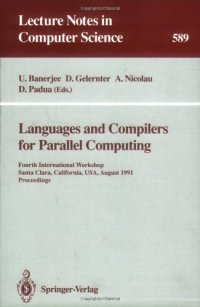
Ebook: Languages and Compilers for Parallel Computing: Fourth International Workshop Santa Clara, California, USA, August 7–9 1991 Proceedings
Author: G. Agha C. Houck R. Panwar (auth.) Utpal Banerjee David Gelernter Alex Nicolau David Padua (eds.)
- Genre: Computers // Organization and Data Processing
- Tags: Computation by Abstract Devices, Programming Techniques, Programming Languages Compilers Interpreters, Arithmetic and Logic Structures, Computer Graphics
- Series: Lecture Notes in Computer Science 589
- Year: 1992
- Publisher: Springer-Verlag Berlin Heidelberg
- Edition: 1
- Language: English
- djvu
This volume contains the proceedings of the Fourth Workshop on Languages andCompilers for Parallel Computing, held in Santa Clara, California, in August1991. The purpose of the workshop, held every year since 1988, is to bring together the leading researchers on parallel programming language designand compilation techniques for parallel computers. The papers in this book cover several important topics including: (1) languages and structures to represent programs internally in the compiler, (2) techniques to analyzeand manipulate sequential loops in order to generate a parallel version, (3)techniques to detect and extract fine-grain parallelism, (4) scheduling and memory-management issues in automatically generated parallel programs, (5) parallel programming language designs, and (6) compilation of explicitly parallel programs. Together, the papers give a good overview of the research projects underway in 1991 in this field.
This volume contains the proceedings of the Fourth Workshop on Languages andCompilers for Parallel Computing, held in Santa Clara, California, in August1991. The purpose of the workshop, held every year since 1988, is to bring together the leading researchers on parallel programming language designand compilation techniques for parallel computers. The papers in this book cover several important topics including: (1) languages and structures to represent programs internally in the compiler, (2) techniques to analyzeand manipulate sequential loops in order to generate a parallel version, (3)techniques to detect and extract fine-grain parallelism, (4) scheduling and memory-management issues in automatically generated parallel programs, (5) parallel programming language designs, and (6) compilation of explicitly parallel programs. Together, the papers give a good overview of the research projects underway in 1991 in this field.